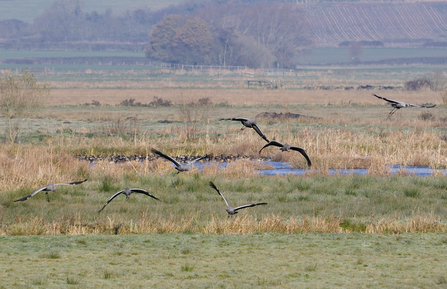Following the adoption of The Kunming-Montreal Global Biodiversity Framework (GBF) in 2022, interest in voluntary biodiversity credits is increasing as governments, organisations, and companies look for effective ways to address the nature crisis. This interest is likely to accelerate where businesses are obliged to report and act on their nature-related dependencies, impacts, risks and opportunities. Biodiversity credit methodologies are now being tested, and they could become a valuable tool in aiding nature's recovery.
In line with the Global Biodiversity Framework, and the UK Government's target, The Wildlife Trusts are calling for at least 30% of our land and sea to be connected and protected for nature’s recovery by 2030. Expanding these spaces will allow wildlife to thrive again and restore beautiful wild places that store carbon and help tackle the linked nature and climate crises.
What is a biodiversity credit?
In the simplest terms, a biodiversity credit is a commodified unit of biodiversity. At present, there is no standardised measurement for this.
Like carbon credits, biodiversity credits can be generated in two ways, either through creating and restoring habitats and achieving a quantifiable uplift, or through conserving high-value habitats, otherwise known as avoided loss credits. At the Wildlife Trusts, we believe that in the UK, in order to ensure additionality and address the dual climate and biodiversity crises, biodiversity credits should only be generated through the creation and restoration of additional spaces for nature.
As well as differences in the way in which biodiversity credits are generated, there are different ways in which they can be sold, either voluntarily or compliance based. In the UK, the only compliance-based biodiversity market is Biodiversity Net Gain (BNG) which only applies in England to developments that fall within the Town and Country Planning Act.

© Nick Upton/2020VISION/naturepl.com
Why buy biodiversity credits?
Biodiversity credits can form an impactful component of your sustainability strategy, whether that’s to comply with regulatory requirements, manage environmental risks, or demonstrate to investors and consumers your commitment to environmental stewardship. Participation in this market will also allow companies to position themselves favorably in anticipation of future regulations, such as the TNFD (more information below), existing regulations in overseas markets which UK companies may have to comply with, such as the EU's Corporate Sustainability Reporting Directive (CSRD), or market demands. By investing in biodiversity credits through the Wildlife Trusts, you are creating and restoring additional spaces for nature as part of our aim to have 30% of our land and sea to be connected and protected for nature’s recovery by 2030.
What is the TNFD and CSRD?
The Taskforce on Nature-related Financial Disclosures (TNFD) has created a framework of recommendations and guidance designed to help businesses and financial institutions assess, report, and manage their nature-related dependencies, impacts, risks, and opportunities. These guidelines aim to integrate nature into decision-making processes, encouraging a shift in global financial flows from nature-negative to nature-positive outcomes.
Since January 2023 in the EU, all large companies and all listed companies must comply with the Corporate Sustainability Reporting Directive (CSRD) and share information about the risks and opportunities they perceive in social and environmental issues, as well as the effects of their activities on people and the environment. Under certain conditions, the CSRD also applies to UK companies operating in the EU.
Biodiversity credits are relevant to these frameworks as they provide a practical tool for organisations to support nature-positive initiatives, helping to align their activities with the Global Biodiversity Framework and demonstrate their commitment to positive environmental impact.
Expressions of interest
The Wildlife Trusts are in the early stages of exploring how we might offer biodiversity credits to our national partners. If your organisation is interested in investing in high-quality biodiversity projects on a national scale, in return for voluntary, high-integrity credits, please fill out our expression of interest form below.
At present, The Wildlife Trusts work with a number of partners to deliver nature-positive projects at scale, for example our temperate rainforest restoration programme and Network for Nature.
For smaller-scale biodiversity initiatives, connect with your local Wildlife Trust to find opportunities tailored to your region. Local Wildlife Trusts offer impactful, community-focused projects that support biodiversity at a regional level. We are currently fielding expressions of interest as we develop our offering in this area.




